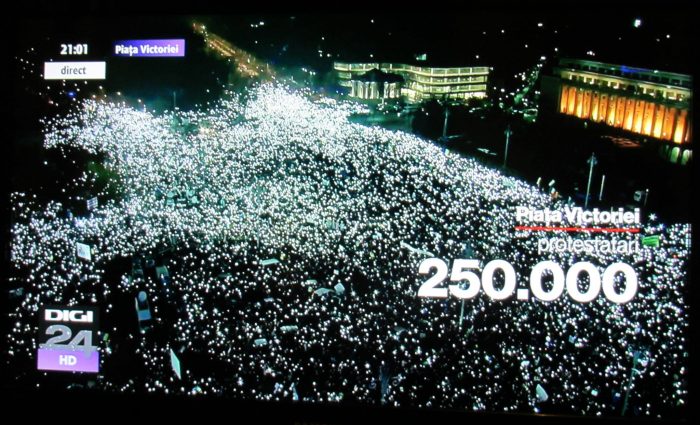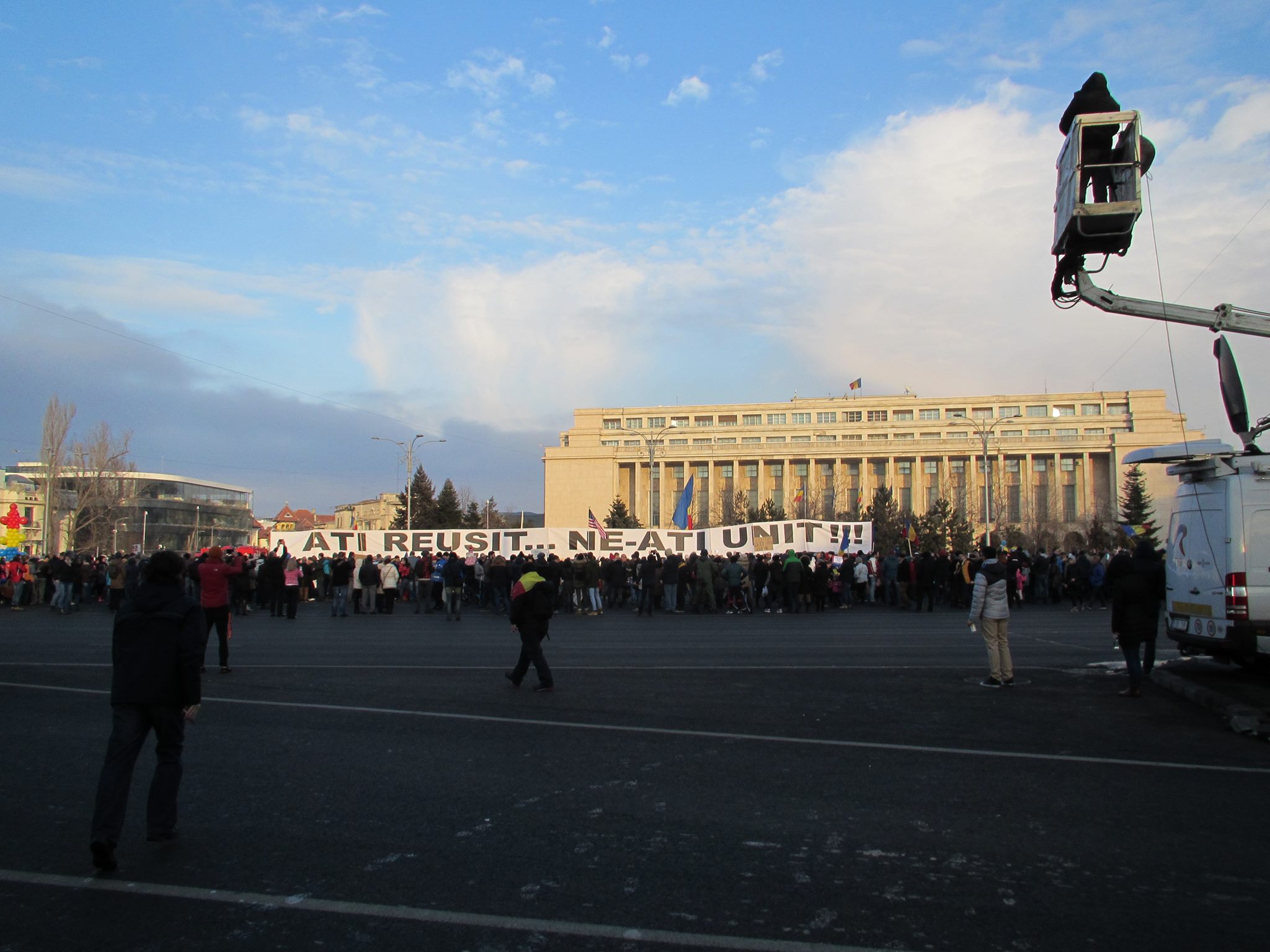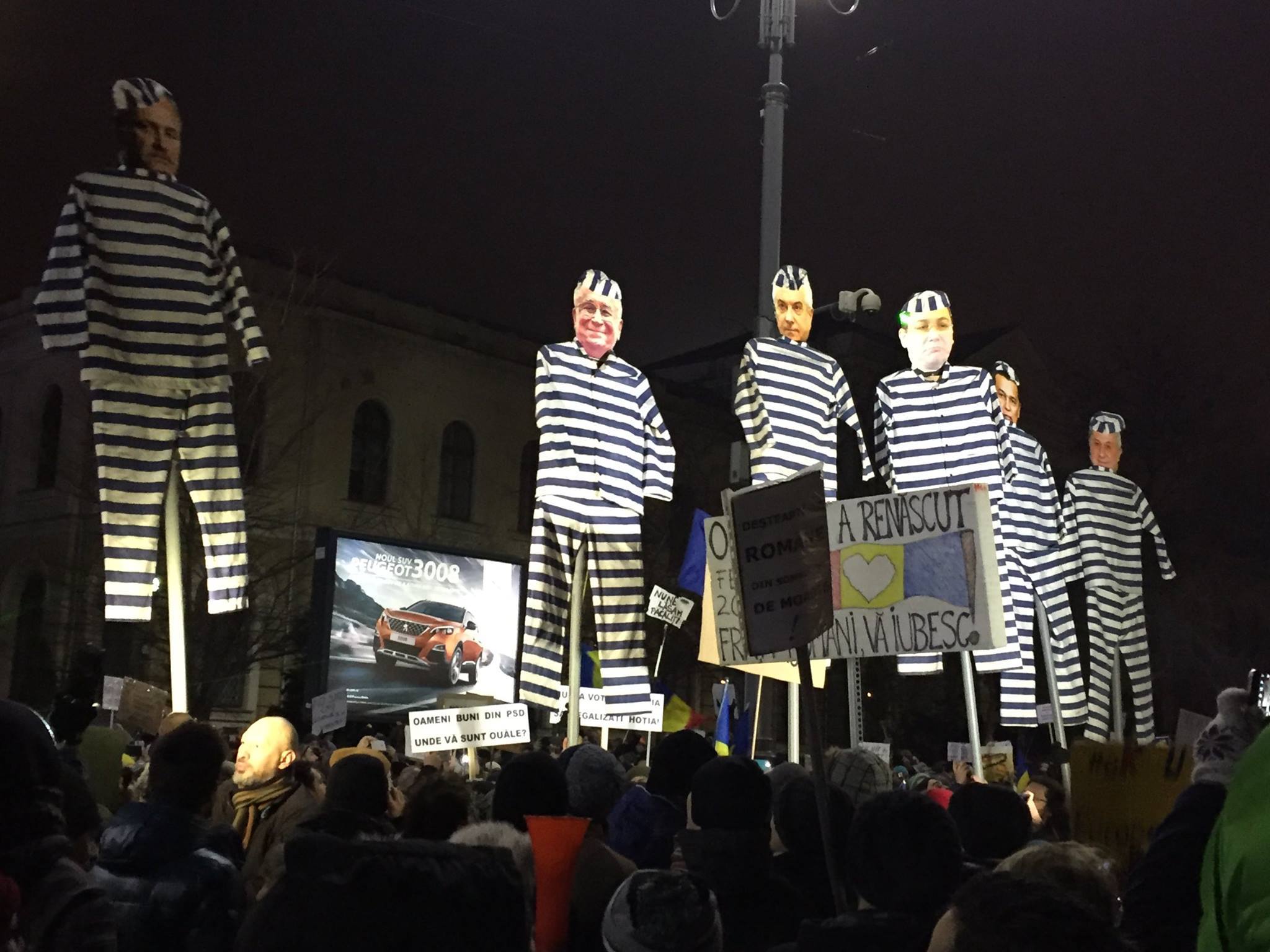The extraordinary demonstrations in support of democracy and the rule of law in Romania, with hundreds of thousands of people taking to the streets across the country and abroad, are the result of excellent journalism. Reporters have played a crucial role in alerting the public to controversial government plans, yet independent journalism in Romania is struggling to survive. Many news organisations have little income, are underfunded and in debt.
The massive protests were sparked by the introduction, last week, of two government bills, aimed at decriminalising a number of offences. These include official misconduct in cases where the financial damage is less than 200,000 lei (£38,000).
Opponents argue the proposed new laws are intended to decriminalise government corruption and help hundreds of current and former politicians avoid criminal investigations. These include Liviu Dragnea, the leader of the governing Social Democratic Party (PSD) who currently faces charges of granting illegal contracts worth about £21,000.
Despite national opposition from the public, the judiciary and even Romania’s president, Klaus Iohannis, the bills were secretly introduced by Dragnea’s government during the night of 31 January.
However, journalists had anticipated the government’s move weeks earlier.
Reporters warned of government plans
A political commentator with HotNews.ro, Dan Tapalagă, had published an article on January 13, headlined: Alert. Amnesty and pardon are coming. Everything for the great escape. The article warned readers: “Several signals and official information obtained by HotNews.ro indicate that PSD, Dragnea and the Cabinet are [launching] their project of amnesty and pardon, and they want to speed it up so that it is in force no later than February.”
One week before this article, President Iohannis had also warned against plans to introduce the legislation. He pointed out that senior government figures might try to erase their own criminal records: “The president of the Chamber of Deputies [Dragnea] is a person convicted for criminal acts and has a criminal investigation in progress; the president of the Senate [Călin Popescu-Tăriceanu, leader of ALDE] is a person prosecuted for a criminal lie. These are worrying circumstances.” PSD and ALDE are part of the ruling coalition that formed the government after the elections in December 2016.
On January 17, a few days after his original HotNews.ro editorial, Dan Tapalagă posted on Facebook that the only way ”to stop the disaster” is for President Iohannis to preside over a government meeting – a right granted to him by the Constitution.
The following morning, the president made an apparently surprise visit to the government building in Victory Square, Bucharest. He asked the media to remain in the chamber to hear his declaration to members of the parliament. “There are two elephants [in the room],” he said. “The government emergency ordinance for pardon and the one for amending the criminal codes.”
The president’s defiant speech was reported as breaking news by all major newsrooms.
Public opposition grows
The widespread publicity forced the Ministry of Justice to publish its ordinances online. Following this, public bodies and opinion leaders joined calls to block the bills and thousands of people started to gather in the streets.
However, the ordinances were adopted by the government and published on the 31 January. One was to be enforced ten days later, the other, to be discussed by parliament 45 days from the publishing date.
Prosecutors have since argued the proposed changes in the law impede the legal fight against corruption, terrorism and human trafficking. The European Commission and the European Parliament have also expressed strong concerns. The street protests grew, with thousands and thousands of people flooding Bucharest’s streets and the city’s Victory Square, day and night.
Discussions on the streets and on social media have been lively and detailed: a Facebook post by Factual, a fact-checking organisation, linking to an explanation on the difference between cancellation, revocation and nullification of the ordinances, had 400 shares in 12 hours. Young people in the street debate how the process can be stopped, either with their friends, or strangers.
“Another question.” Excellent journalism has impact
For excellent journalism to go viral, a community needs well prepared, calm and determined media workers. How else can a journalist fight back but to question and persist?
The following dialogue took place with the Minister of Justice, in a press conference, just after the news of the publication of the ordinances went public:
Reporter: “Don’t answer in theory.”
Minister: “Please, madam, ask me another question, if you have one.”
R: “If you are going to be accused, and now [with these ordinances] it will be impossible, isn’t it?”
M: “Do you have another question?”
R: “… of aiding and abetting someone to commit a crime. You will not be liable any more, correct?”
M: “I have answered you, madam. Another question, if you have one.”
R: “You haven’t answered me. It is a simple, closed question, yes or no?”
M: “I answered you, madam. Another question, if you have one.”
R: “No. Yes or no?”
M: “I have answered you [moving the eye to the other part of the newsroom]. Another question, if you have one.”
The Minister said “Another question” 24 times during the same press conference, as a result the phrase became the theme of the demonstrations. The press conference was broadcast live on all news programmes, and “another question” haunted the news for days. The reporter was Andrada Dumitrescu, from Realitatea TV.
Journalism in Romania: independent, professional but underfunded
Excellent journalists cannot live on thin air. To be able to obtain, understand and transmit information, journalists have to specialise in a field, so they become knowledgeable and known to relevant sources. Excellent journalism needs money that has to come from somewhere, even when times are calm and people are less interested in events.
Realitatea TV has been insolvent since 2011. Realitatea shares the market with four other all-news television stations. The most financially stable seems to be Digi 24. It is supported by a telecom/ cable/ energy conglomerate.
The debts of Romania’s national broadcaster, Televiziunea Romana, (TVR), are higher than its revenues. Narrative journalism barely survives on cash prizes and donations (Casa Jurnalistului), or is supported by a complex business model that included events and merchandising (Decât o revistă). Investigative journalism has resorted to grants (Rise Project).
Other outlets survive on less and less advertising money, so it is helpful if the newsroom is part of a generalist television (like ProTV), or is in the same group with a tabloid (‘yellow top’) newspaper – which can often supply cash for the reference title (Adevărul and Click). All of these newsrooms are staffed with young reporters, eager to learn, to grow and to produce good, independent journalism.
How news and information supported popular demonstrations
Under these market conditions, it seems a wonder that excellent journalism exists and can support a popular movement for the rule of law, until we look closely at the characteristics of the information that spread so rapidly and lead to such impressive actions.
The way the news spread amongst Romania’s public had the four key elements of a classic example of the theory of Diffusion of Innovations, the title of a book by Everett M. Rogers. Rogers argues that diffusion is the process by which an innovation is communicated over time among the participants in a social system.
Both President Iohannis and journalists acted as change agents in the process, to mobilise Romanian citizens to defend democracy and the rule of law, in a collective-innovation decision.
This process helped information to quickly go viral on Facebook. During the protests, Romanian audiences would move from social media to news sites and television. Many used their phones to remain updated with news via radio and internet.
During the political unrest, traffic to a number of news sites increased threefold – some could not cope with the overload and became inaccessible at times.
Politically supported corruption – a major public concern
PSD is the party that was forced to step down from government in November 2015, following public pressure, just four days after a fire destroyed Colectiv, a club in Bucharest, due to gross neglect in the implementation of fire safety rules by authorities.
The President nominated a cabinet of technocrats, to ensure transition for one year. This new government, led by Dacian Cioloș, a former European Commissioner, stressed the importance of strengthening democracy and the rule of law and raised trust in government to the point that, for example, software developers volunteered to work for the public good.
Politically supported corruption has been high on the public agenda since before the country joined the European Union in 2007. In 2016, the subject was painfully brought back to the public consciousness due to a journalistic investigation about disinfectants, linked to the deaths of the hospitalised victims from Colectiv nightclub.
In December 2016, after a very quiet electoral period, PSD won the parliamentary elections again and formed a governing coalition with ALDE. The quiet period stopped when talks about amnesty and pardon started.
On Sunday, February 5th, the Cabinet decided to adopt a second ordinance, canceling the first one, on the same day as a massive public demonstration, in which an estimated half a million people marched in Bucharest and in towns and cities across the country.
Meanwhile the demonstrations continue with energy, optimism and emotion. “Believe me, I was here other nights, too: you simply get infected with common sense in the streets,” a man explains.
Update: 19.2.2017: the Romanian government was accused of ‘totalitarian thinking’ after the Ministry of Internal Affairs named journalists it claimed had ‘publicised the demonstrations’ on social media. https://mappingmediafreedom.org/#/3619
Pics by Raluca Radu and Alexandra Bardan
Tags: change, corruption, Democracy, Diffusion of innovations, independent journalism, Journalism, media, Online journalism, ordinances, protests, Romania, Social media

















































